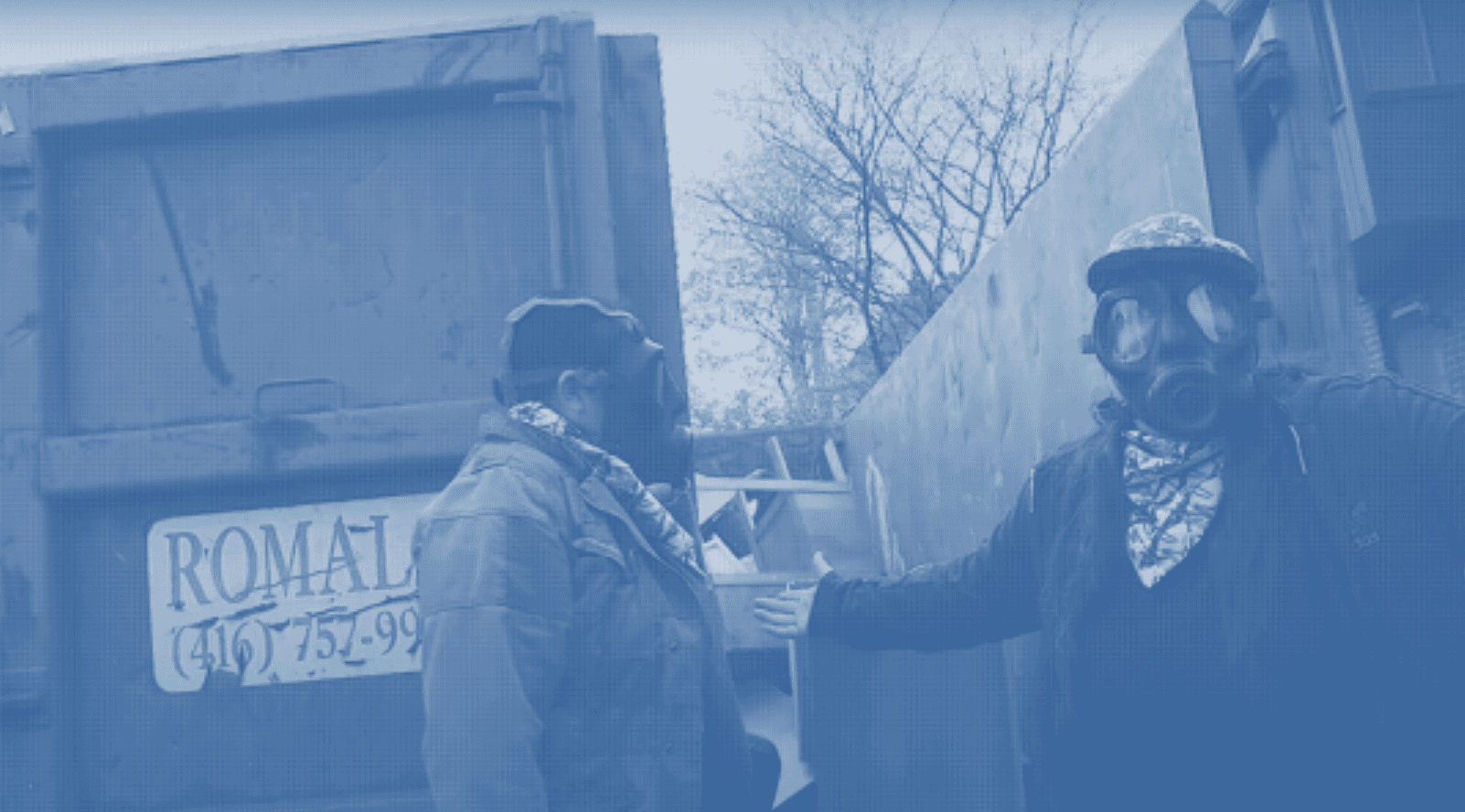Reclamation (2018)


Reclamation (2018)

Reclamation (2018)
Reclamation (2018)


“I was scared that they had done so much to this planet that there would be no way to fix it,” a subject claims in the Canadian short documentary, Reclamation. The interviewee sits on the couch with her partner, both sporting bandanas that they use for outdoor protection along with their trusty gas masks. While a global nuclear war left Earth nearly inhabitable, the white people’s escape to Mars has created an opportunity for those left behind to forge a new future for their community.
Thirza Jean Cuthand’s 2018 documentary offers a new idea of both the future along with our relationship to it. As a genre, documentary returns to the past through the lens of our present. At first glance, Reclamation seems to do just that – documenting efforts to revitalize indigenous land after its destruction by whiteness and capitalism in its many forms. But it is a present yet to come. Cuthand’s documentary then speculates on the future, predicting worlds to come based on a destructive trajectory originating from today. What’s more, this highly creative glimpse of the future refuses current forms of technological prediction weaponized against subjects of the present. Although prediction has been used to regulate subjects of the present, Cuthand refuses these attempts to master the future, creating instead this speculative document of a community freed from capitalist accumulation.

While prediction has long been a tool to master the future, the nature of such a future remains unclear. While apps like PredPol and predictive algorithms as a whole claim to unlock the future, Wang exposes the flaws behind these predictions. For one, they necessitate finding certainty in a world that denies it altogether. Whether it be the financial market or political elections, time and time again we find ourselves in the aftermath of incorrect predictions and an uncertain future. Wang cites Financial Times associate editor Wolfgang Munchau who argues “you can no longer be certain that you can extrapolate the trends of the past into the future.” This radical uncertainty shadows Wang’s own personal life where she pursues her Ph.D. at Harvard while her brother serves a forty-year prison sentence despite having the same backgrounds on paper.
The murkiness of such predictions is troubling given the severity of their consequences. “High risk” credit applicants are targeted by predatory loans. Unpaid fines can balloon into mountains of debt with a prison sentence at the end. For those that fall victim to these tools, they find themselves stuck in a foreclosed future. “Predictions,” Wang argues, “are much more about constructing the future through the present management of subjects categorized as threats or risks.” These predictions therefore help build a future for only the select few who do not fall under the matrices of oppression disproportionately targeted by algorithms under the guise of neutral public safety. While promising control of the future, PredPol seems to lack any vision of what such a future might look like. At its worst, this seemingly neutral technology blindly constructs a future through overseeing present subjects who are disproportionately racialized and gendered.

Rather than shaping the future behind the curtain of flawed algorithms, Reclamation jumps directly forward to imagine a world freed from this technology of accumulation. Earth’s remaining inhabitants spend their days collecting trash in large storage containers, restoring the Earth in the hopes that they may one day walk barefoot again. One subject celebrates how fresh the air smells, how crystal the black water has become. Another speaks of her freedom from Google’s overload of information when its collapse pushed her back into the physical world. In a future void of technology, the documentary’s subjects have no other choice but to return to the ecology around them.
One interviewee asks us: “Now that the box they put you in is gone, who are you?” Freed from accumulation, the subjects of the documentary are able to actively envision a creative future of coexistence. Rather than instantiating predative and destructive habits, they return to indigenous tradition – away from capitalism towards a culture of sustenance. This new world thrives on a radical creativity that opens new forms of community such as collective childcare – an investment as well in future generations. The subjects of this speculative future are both indigenous and queer, reclaiming and recentering identities torn apart by whiteness, capitalism, and heteropatriarchy.

Reclamation offers a new way to predict the future. While documentary is typically a document of the past, Cuthand imagines one to come. Against the grain of capitalistic predictions, this documentary looks back on the rupture of an apocalypse to emphasize how speculative the future can be. “You know how they say the human body can repair itself? Well that’s what’s happening on Earth right now.”
“I was scared that they had done so much to this planet that there would be no way to fix it,” a subject claims in the Canadian short documentary, Reclamation. The interviewee sits on the couch with her partner, both sporting bandanas that they use for outdoor protection along with their trusty gas masks. While a global nuclear war left Earth nearly inhabitable, the white people’s escape to Mars has created an opportunity for those left behind to forge a new future for their community.
Thirza Jean Cuthand’s 2018 documentary offers a new idea of both the future along with our relationship to it. As a genre, documentary returns to the past through the lens of our present. At first glance, Reclamation seems to do just that – documenting efforts to revitalize indigenous land after its destruction by whiteness and capitalism in its many forms. But it is a present yet to come. Cuthand’s documentary then speculates on the future, predicting worlds to come based on a destructive trajectory originating from today. What’s more, this highly creative glimpse of the future refuses current forms of technological prediction weaponized against subjects of the present. Although prediction has been used to regulate subjects of the present, Cuthand refuses these attempts to master the future, creating instead this speculative document of a community freed from capitalist accumulation.

While prediction has long been a tool to master the future, the nature of such a future remains unclear. While apps like PredPol and predictive algorithms as a whole claim to unlock the future, Wang exposes the flaws behind these predictions. For one, they necessitate finding certainty in a world that denies it altogether. Whether it be the financial market or political elections, time and time again we find ourselves in the aftermath of incorrect predictions and an uncertain future. Wang cites Financial Times associate editor Wolfgang Munchau who argues “you can no longer be certain that you can extrapolate the trends of the past into the future.” This radical uncertainty shadows Wang’s own personal life where she pursues her Ph.D. at Harvard while her brother serves a forty-year prison sentence despite having the same backgrounds on paper.
The murkiness of such predictions is troubling given the severity of their consequences. “High risk” credit applicants are targeted by predatory loans. Unpaid fines can balloon into mountains of debt with a prison sentence at the end. For those that fall victim to these tools, they find themselves stuck in a foreclosed future. “Predictions,” Wang argues, “are much more about constructing the future through the present management of subjects categorized as threats or risks.” These predictions therefore help build a future for only the select few who do not fall under the matrices of oppression disproportionately targeted by algorithms under the guise of neutral public safety. While promising control of the future, PredPol seems to lack any vision of what such a future might look like. At its worst, this seemingly neutral technology blindly constructs a future through overseeing present subjects who are disproportionately racialized and gendered.

Rather than shaping the future behind the curtain of flawed algorithms, Reclamation jumps directly forward to imagine a world freed from this technology of accumulation. Earth’s remaining inhabitants spend their days collecting trash in large storage containers, restoring the Earth in the hopes that they may one day walk barefoot again. One subject celebrates how fresh the air smells, how crystal the black water has become. Another speaks of her freedom from Google’s overload of information when its collapse pushed her back into the physical world. In a future void of technology, the documentary’s subjects have no other choice but to return to the ecology around them.
One interviewee asks us: “Now that the box they put you in is gone, who are you?” Freed from accumulation, the subjects of the documentary are able to actively envision a creative future of coexistence. Rather than instantiating predative and destructive habits, they return to indigenous tradition – away from capitalism towards a culture of sustenance. This new world thrives on a radical creativity that opens new forms of community such as collective childcare – an investment as well in future generations. The subjects of this speculative future are both indigenous and queer, reclaiming and recentering identities torn apart by whiteness, capitalism, and heteropatriarchy.

Reclamation offers a new way to predict the future. While documentary is typically a document of the past, Cuthand imagines one to come. Against the grain of capitalistic predictions, this documentary looks back on the rupture of an apocalypse to emphasize how speculative the future can be. “You know how they say the human body can repair itself? Well that’s what’s happening on Earth right now.”